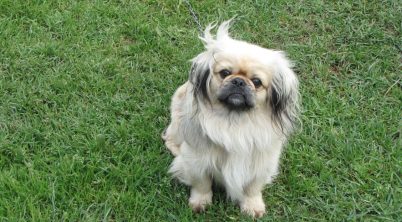Understanding the intricacies of Pekingese pregnancy is crucial for breeders and owners alike to ensure the health and wellbeing of both the mother and her future litter. The Pekingese is a small breed dog with a gestation period that typically spans approximately 63 days, although a range from 57 to 65 days is considered normal. Monitoring and caring for a pregnant Pekingese requires attention to several important factors including diet, exercise, and regular veterinary check-ups.
Breeding Pekingese should always be a carefully considered and planned endeavor. Recording the exact dates of mating is essential as it enables the prediction of the whelping date with greater accuracy. As with any canine pregnancy, breeders may note hormonal and physical changes in the Pekingese as she prepares for birth. To support a healthy pregnancy, breeders must provide a balanced nutrition plan, a safe environment, and modify exercise routines appropriately as the pregnancy progresses.
The stages of Pekingese pregnancy entail both embryonic and fetal periods, with significant developments at each stage. During the first few weeks, the embryos implant and the major organs begin to develop. By the fifth week, the development enters into the fetal phase, marking a period of rapid growth. Recognizing these stages and adapting care accordingly can be instrumental in ensuring a successful pregnancy and the birth of healthy Pekingese puppies.
Table of Contents
Preparing for Pekingese Pregnancy
Preparing a Pekingese for pregnancy involves several important steps, ensuring the health and safety of both the mother and her future puppies. These steps range from pre-breeding vet exams to creating an optimal living environment, tailoring diet and nutrition, and adjusting exercise routines.
Pre-Breeding Health Checks
Before breeding, it’s crucial to ensure that the Pekingese dog is healthy. Regular check-ups with a veterinarian are essential to screen for any underlying health issues. Checking the female’s overall health, including her reproductive fitness, is mandatory to prevent complications during pregnancy.
Understanding the Pekingese’s Breeding Cycle
Timing is key in the breeding cycle. A Pekingese’s heat cycle typically occurs every six months, and recognizing signs of readiness like willingness to mate and tail lifting is important. Scheduling mating during the fertile window can increase the chances of a successful pregnancy.
Creating a Nurturing Environment
The environment should be clean, safe, and comfortable for a pregnant Pekingese. Comfort plays a significant role in a stress-free pregnancy. Ensure the living space is free from hazards and provide a cozy area for rest.
Diet and Nutrition Planning
A Pekingese’s diet should be rich in essential nutrients and protein to support the growing puppies. Increase calorie intake gradually as weight gain is a normal part of pregnancy. Avoid sudden diet changes to prevent causing discomfort or health issues.
- Essential Nutrients:
- Protein: Supports fetal development
- Folic Acid: Prevents birth defects
- DHA: Aids in brain development
Exercise and Care Routines
Regular but gentle exercise helps maintain a healthy weight and reduces pregnancy-related discomfort. Adjust the intensity and duration of the Pekingese’s exercise routine as she progresses through pregnancy stages. Maintain regular grooming to manage any added weight’s strain on skin and coat health.
Monitoring Pregnancy Milestones
When monitoring a Pekingese pregnancy, it is essential to be aware of the physical and health changes the dog will go through. Key milestones include the early signs of pregnancy, vet visits and check-ups, tracking fetal development, and preparing for whelping.
Early Signs of Pregnancy
A Pekingese may exhibit signs of pregnancy as early as a few weeks post-mating. Owners should look for physical changes such as slight weight gain, increased appetite, and possible behavioral adjustments. The dog’s abdomen will gradually enlarge as the puppies grow. These signs can be subtle, so keen observation is vital.
Vet Visits and Pregnancy Check-Ups
Regular veterinarian check-ups are critical to the health of a pregnant Pekingese. Health screenings and ultrasounds can confirm a pregnancy and monitor the pups’ development. A veterinarian may recommend specific tests for genetic conditions such as progressive retinal atrophy. Scheduling these visits strategically through the pregnancy will ensure the wellbeing of both the mother and her puppies.
Tracking Fetal Development
Throughout the pregnancy, which lasts about 57 to 65 days, tracking fetal development is a key component of prenatal care. Owners should maintain a chart that contains weight gain, dietary changes, and physical changes in the Pekingese. Around day 30, an ultrasound can confirm the pregnancy, and by day 45, a vet can usually palpate the abdomen to check the puppies.
Preparing for Whelping
As the Pekingese approaches the end of the pregnancy, preparation for whelping becomes essential. The dog should have a comfortable, quiet, and clean whelping area. Owners must ensure that all needed supplies are on hand for the birth. It’s also prudent to discuss the whelping process with a vet to be fully prepared for potential complications.
Postpartum Care for Mother and Puppies
Proper postpartum care is essential for the health and development of both the Pekingese mother and her puppies. Attention to nutrition, cleanliness, and early socialization is pivotal during this delicate stage.
Immediate Postpartum Support
Immediately after birth, the Pekingese mother requires a quiet, comfortable space to rest and nurse her puppies. Cleanliness is crucial, so bedding should be kept clean and dry to prevent infection. The mother’s energy level will likely be low; monitor her health closely, watching out for signs of distress or excessive lethargy.
Long-Term Health and Well-being
Over the following weeks, focus on the Pekingese’s nutrition and care. The mother’s diet should be rich in calories and nutrients to support lactation; quality puppy food is often recommended for nursing mothers due to its high energy content. Gradual reintroduction of exercise helps maintain her weight and health but should not be strenuous.
Puppy Socialization and Early Training
Puppies benefit from early socialization and exposure to various stimuli to grow into well-adjusted adults. Engage them in gentle play to encourage playfulness and start simple training exercises using patience, praise, and positive reinforcement methods.
Consideration for Spaying
Postpartum is also a time to consider spaying the mother to prevent future unplanned litters, reduce certain health risks, and potentially calm her temperament. Consult with a veterinarian to determine the appropriate timing for this procedure.
Finding Reputable Homes for Puppies
When the time comes to find homes for the puppies, it is essential to ensure they go to responsible owners. A reputable breeder will thoroughly screen potential adopters to ensure that the puppies will receive ongoing companionship, care, and nutrition, adhering to a high standard for Pekingese health and happiness.








